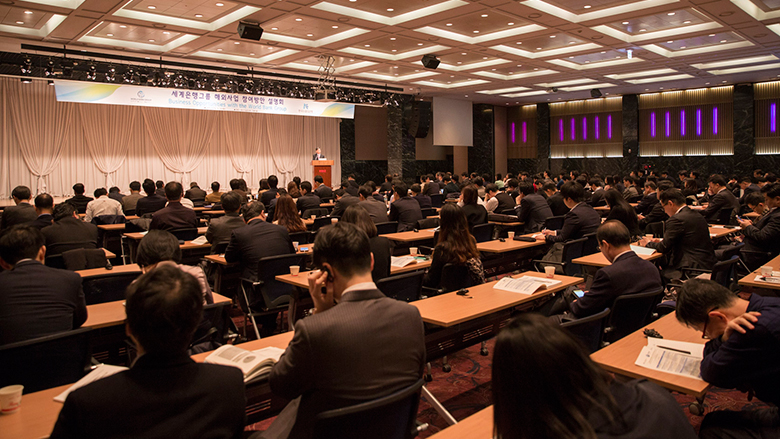SEOUL, Korea, March 31 -- More than 200 participants representing 120 Korean companies and public institutions attended the “Business Opportunities with the World Bank Group” workshop here to learn about the World Bank’snew procurement policy.
The workshop, organized by the World Bank Korea Office and the Export-Import Bank of Korea, builds on last year’s successful event on the same theme. It provided specific information on the existing portfolio and pipeline opportunities in World Bank projects across three key sectors – energy, transportation and water – where Korean companies have particular expertise.
The workshop provided information about two other arms of the World Bank Group – IFC and MIGA – and their growing private sector investments. Korean companies are increasingly important partners for IFC, as they look overseas for opportunities to leverage their experience and expertise in infrastructure, manufacturing, services and financial services.
Yoon-kyung Kim, Deputy Director General at the Korean Ministry of Strategy and Finance, in his opening remarks stressed that with its successful development model, Korea has to play a bigger role as a responsible member of the international community. To this end, not only the Korean government, but also the private sector needs to make more efforts. “I hope that more Korean companies participate in development projects by taking advantage of their expertise and creative ideas,” he said.
Elmas Arisoy, World Bank Procurement Manager for EAP region, introduced the Bank’s new procurement policy and explained that the new framework considers value-for-money as one of the core principles of the Bank’s new procurement policy.
“This implies that in many complex procurements, not only initial capital investment cost, but the whole life cycle cost will be taken into consideration in determining the contract award,” she said.
In the three parallel sessions on energy, transportation and water sectors, procurement specialist from Africa, Europe and Central Asia and East Asia teamed up with colleagues from respective global practices to demonstrate to the audience how to access project information and bidding advertisement step by step.
Participants from Korean companies gained sector specific knowledge to better understand the process and guidelines about approaching contracts followed by one-to-one meetings with sector experts.
Jianjun Guo, Senior Procurement Specialist, discovered that many Korea firms didn’t know how to access information about Bank-financed projects and potential bidding opportunities. “At the same time, they don’t realize that they actually do have strength in many areas in Bank-financed projects and the borrower countries do have demand for their strength,” he said. “Under the Bank’s new procurement framework, the Korea firms will have even more business opportunities.”
Participants found the parallel sessions a great capacity building opportunity. “From the next project, we will apply what we have learned from today,” said a participant from Dohwa Engineering, a multi-disciplinary engineering SME.
Shawkat M.Q. Hasan, Senior Procurement Specialist, found that the Bank’s team has equally benefited from the exposures to the Korean companies. “Going forward, we should think of organizing more focused and targeted workshops to take the participants through matters like the process of bid preparation, standard contract terms in the Bank’s standard procurement documents,” he said.
Joyce Msuya, Special Representative of the World Bank Group Korea Office, told the participants that the Korea Office will continue to work closely with the Ministry of Strategy and Finance and Export-Import Bank of Korea to engage Korean companies who seek to explore business opportunities with the World Bank Group in the future.

